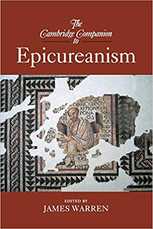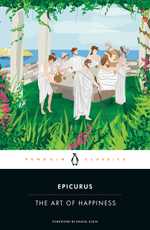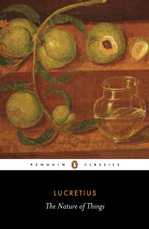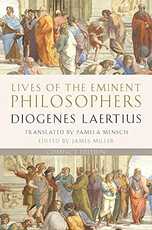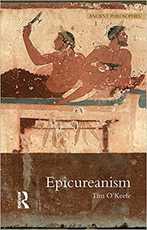

Epicureanism The Best 6 Books to Read
Epicureanism is a philosophy based on the teachings of the ancient Greek thinker Epicurus, and a strong philosophical rival to Stoicism, another prominent ancient Greek philosophy.
Often caricatured as a rather hedonistic, pleasure-obsessed philosophy, Epicureanism (as we outline in our brief Epicureanism definition and explainer) is actually more about living life free from anxiety and bodily pain, and places a strong emphasis on untroubling the mind and cultivating friendship and community in the search for a meaningful, happy human life.
And, as well as a popular ethics, Epicureanism also offers a rich epistemology and metaphysics. Epicurus rejected the existence of an immaterial soul, or of anything non-physical, and said that the gods have no influence on our lives. This led to a rather unsentimental attitude towards mortality — Epicurus believed fearing death was highly irrational — which we discuss further in our explainer on why Epicurus said death is ‘nothing to us’.
Only fragments of Epicurus’s own writings survive (they’re collectively presented in The Art of Happiness, listed below). Among these fragments are Epicurus’s 40 Principal Doctrines (we present and discuss these 40 short Epicurean aphorisms here), which we know of only because they are quoted in full in Diogenes Laertius’s celebrated third-century survey of ancient Greek thinkers, Lives of the Eminent Philosophers.
While Epicurus’s 40 Principal Doctrines and other fragments do offer concise summaries of Epicurean thinking, the bulk of what we know about Epicurean philosophy comes largely through the work of Epicurus’s contemporaries, followers, and critics from the ancient Greco-Roman period.
In one concise email each Sunday, I break down a famous idea from philosophy. You get the distillation straight to your inbox:
💭 One short philosophical email each Sunday. Unsubscribe any time.
A particularly noteworthy figure in this respect is the Roman poet Lucretius, whose epic poem On the Nature of Things forms the cornerstone of what we know about how Epicurus saw the world (as discussed in our brief article on Lucretius’s beautiful reflection on Epicureanism and mortality).
From introductions and anthologies to ancient sources, this reading list consists of the best books of and about Epicureanism. After reading it, you’ll understand exactly why this ancient philosophy remains a deeply influential guide for those looking to live good and meaningful lives today. Let’s dive in!
1. Epicureanism, by Tim O’Keefe
Published in 2009, Tim O’Keefe’s Epicureanism is a fantastic place to start for anyone with an interest in the Epicurean view on the world.
O’Keefe explores Epicurean metaphysics, epistemology, and ethics with accessible language and balance, examining the strengths and weaknesses of Epicurean arguments, and outlining how the philosophy hangs together as a whole. Written with a popular audience in mind, this is an easy, concise entry point into Epicureanism.
2. The Cambridge Companion to Epicureanism, by James Warren
If you’re seeking a deeper, more philosophically rigorous and thorough introduction to Epicurean thinking, look no further than The Cambridge Companion to Epicureanism, edited by James Warren.
This volume assembles 15 brilliant essays from leading scholars discussing various aspects of Epicurean thought, including chapters on Epicurean physics, metaphysics, epistemology, politics, ethics, and more.
While the focus of the essays can extend beyond Epicurus, The Cambridge Companion to Epicureanism belongs on the bookshelf of any serious student of Epicureanism.
3. How to Live a Good Life (According to 7 of the World’s Wisest Philosophies), by Philosophy Break

How to Live a Good Life (According to 7 of the World’s Wisest Philosophies)
BY PHILOSOPHY BREAK
★★★★★ (100+ reviews)
Get Instant AccessIf you’re interested in learning not just about Epicureanism, but comparing its insights to six rival philosophies for life, look no further than the 2026 How to Live a Good Life (According to 7 of the World’s Wisest Philosophies). This concise online guide is instantly accessible from any device and distills the best and most important wisdom from Epicureanism, Stoicism, Buddhism, and more.
Of course, we’re a little biased, as we produced this one — but if you’re seeking to understand some of life’s most influential ethical frameworks, examine the pros and cons of each, and discover how they might apply to your own life, then this is the guide for you. How to Live a Good Life (According to 7 of the World’s Wisest Philosophies) gets rave reviews, is better value than buying introductory books for all philosophies covered, and might be just what you’re looking for!
4. The Art of Happiness, by Epicurus
Turning from introductions to primary texts, where better to start than with the writings of Epicurus himself?
The Art of Happiness includes all the Epicurean writings in existence, including Epicurus’s letters, Principal Doctrines, and Vatican sayings, and places them alongside parallel passages from Lucretius, Diogenes Laeritius, and a compelling introductory essay from the writer Daniel Klein.
The Art of Happiness belongs on the bookshelf of anyone curious about Epicurus.
5. On the Nature of Things, by Lucretius
Another beautiful ancient source espousing the core tents of Epicureanism, On the Nature of Things is a didactic, six-book poem exploring everything from the fundamental nature of reality and what we can know, to the character of goodness and how we should best live.
Since its publication over 2,000 years ago, Lucretius’s poem has been celebrated by such thinkers as Montaigne, Thomas Jefferson, and Einstein. It’s a fantastic, lyrical, essential work of Epicurean philosophy.
6. Lives of the Eminent Philosophers, by Diogenes Laertius
Compiled in the third century CE, Diogenes Laertius’s Lives of the Eminent Philosophers has provided generations of people with incredible insight into the lives and philosophies of ancient Greco-Roman philosophers.
It’s an absolutely critical source for fragments of ancient works that would otherwise be lost, and Epicureanism is no exception, with book ten of Lives of the Eminent Philosophers dedicated to Epicurus, providing a brief commentary on and presentation of his works.
While the Epicurean material in this book is also compiled in The Art of Happiness, Lives of the Eminent Philosophers is worthy of a place on your bookshelf for covering multiple brilliant ancient thinkers, from Pythagoras to Aristotle.
Further reading
Are there any other books you think should be on this list? Let us know via email or drop us a message on Twitter or Instagram.
In the meantime, why not explore more of our reading lists on the best philosophy books:

View All Reading Lists
Essential Philosophy Books by Subject
About the Author

Get one mind-opening philosophical idea distilled to your inbox every Sunday (free)

From the Buddha to Nietzsche: join 25,000+ subscribers enjoying a nugget of profundity from the great philosophers every Sunday:
★★★★★ (100+ reviews for Philosophy Break). Unsubscribe any time.

Latest Breaks
Each philosophy break takes only a few minutes to read, and is crafted to expand your mind and spark your curiosity.
